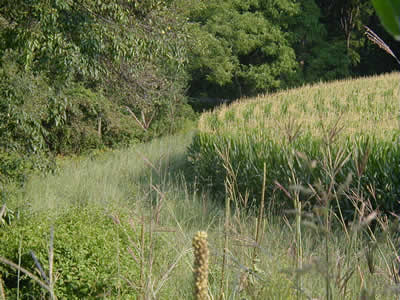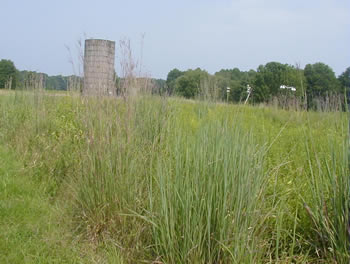|
Wildlife Habitat Incentives Program Funding Available
By Timothy Dunne
NRCS Resource Conservationist
November, 2004
The US Department
of Agriculture (USDA) Natural Resource Conservation Service (NRCS) has funding available for the popular Wildlife Habitat Incentives Program (WHIP). Applications for the Wildlife Habitat Incentives Program (WHIP) will be accepted by NRCS Service Centers at any time during the year. The first application period for fiscal year
2005 closes December 17, 2004. Applications received after that date will be held
until the next round of funding.
|
The Wildlife Habitat Incentives Program is a voluntary program that provides
technical and financial assistance to landowners to create, enhance or maintain
wildlife habitat on their lands. New Jersey is more than 75% private land, and
WHIP targets privately held lands including farms, gun club lands and other private
open space. WHIP funding is also available to any non-Federal lands such as municipal,
county and state lands.
One private land success story is the WHIP project at the Warren County Rod
& Gun Club near Asbury, NJ. In 2002 the club enrolled their land in WHIP to improve
wildlife habitat for small game in the rolling hills of Warren County along the
Musconetcong River. Since that time the club has installed 30'-75' wide field
borders of native grasses along most of the farm's corn fields. The field borders
provide important winter cover and spring nesting sites for local wildlife.
|
 Field
borders of native grasses provide nesting sites and winter cover for farm wildlife
as well as water quality protection to streams from potential agricultural runoff.
Field
borders of native grasses provide nesting sites and winter cover for farm wildlife
as well as water quality protection to streams from potential agricultural runoff.
|
The club has also removed acres of invasive exotic vegetation such as multiflora
rose and tree-of-heaven (Ailanthus). NRCS has provided technical assistance to
the club as well as 75% of the costs of the project. The club's labor was used
to provide the remaining 25% match, so no real out-of-pocket expenses were incurred
by the club. The pheasant hunters at the semi-wild club report improved cover
and better hunting opportunities since the project began. The field borders also
provide nesting habitat for several species of threatened or endangered grassland
birds as well as water quality protection for the Musconetcong River.
 Diverse
grassland habitat will be maintained at the Robert J. Stahl Natural Area in Bedminster
Township, Somerset County, through a 5-year WHIP agreement.
Diverse
grassland habitat will be maintained at the Robert J. Stahl Natural Area in Bedminster
Township, Somerset County, through a 5-year WHIP agreement. |
Bedminster
Township in Somerset County enrolled the 183 acre Robert J. Stahl Natural Area
in WHIP in 2004. The township had a plan prepared in the late 1990s by an environmental
consultant that outlined mowing and brush-hogging to be accomplished on this important
grassland bird nesting area. The WHIP agreement calls for township public works
crews to mow and brush-hog several fields each year.
The
site will have 45 acres of diverse grassland habitats throughout the five-year
WHIP agreement. NRCS will provide 75% of the costs of mowing to the township.
Grasshopper sparrows, bobolinks and northern harriers will benefit as well as
the many birders, hikers and horseback riders that use the area.
|
WHIP assistance in New Jersey is targeted to specific habitat
restoration areas. In order to be eligible for WHIP funding in New Jersey a project
must either be:
-
located
in Lower Cape May (a priority wildlife habitat area)
- on lands providing habitat for the federally threatened bog turtle
- dedicated to early successional wildlife habitat, such as grassland restoration
- dedicated to riparian wildlife habitat
- for invasive exotic vegetation control, or
- a school-site habitat development project for environmental education
WHIP
applications are ranked according to their environmental benefits and cost effectiveness.
The highest-ranking projects are provided funding to implement a 5- to10-year
wildlife habitat development plan. Local NRCS conservationists provide planning
assistance, with help from NRCS biologists as well as biologists from partner
organizations, such as the NJ Division of Fish & Wildlife and the US
Fish & Wildlife Service. The wildlife habitat development plan will describe
the landowner's wildlife habitat goals, list the habitat improvement practices
desired, and include a schedule of implementation.
Landowners are encouraged to sign up now but applications will be accepted all year. To sign up for the Wildlife Habitat Incentives Program or for more information on WHIP priority categories and benefits, landowners can contact any USDA Service Center. USDA Service Centers and office locations are listed in the telephone book under
the US Department of Agriculture and can also be found on the NRCS-NJ website
at www.nj.nrcs.usda.gov.
The application form is available at that website, as well, and can be downloaded
from www.nj.nrcs.usda.gov/programs/whip/.
|


